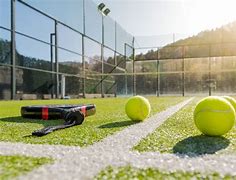

The Rise of Padel Tennis Rackets A Look at the Industry
Padel tennis, a racquet sport that combines elements of tennis and squash, has gained immense popularity over the past few years across the globe. As this sport grows, so does the demand for high-quality padel tennis rackets. The emergence of specialized factories dedicated to the production of these rackets has significantly transformed how players engage with the sport. This article explores the evolution of padel tennis rackets, the intricacies of their manufacturing process, and what makes a factory dedicated to their production unique.
The Evolution of Padel Tennis
Originating in Mexico in the 1960s, padel tennis has steadily been making strides on the international sports stage. A distinct feature of padel is that it is played in an enclosed court, allowing for unique gameplay elements that require specialized equipment. Unlike traditional tennis rackets, padel rackets are solid with no strings, which necessitates a different approach to both design and manufacturing.
The rise in the number of padel clubs and tournaments has sparked interest from players of all ages and skill levels. Consequently, the demand for quality equipment has surged, making it crucial for manufacturers to understand the specific needs of this sport.
Manufacturing of Padel Tennis Rackets
The production of padel tennis rackets begins with the selection of materials
. Typically, manufacturers utilize a blend of carbon fiber and fiberglass, with the core being made from foam or EVA (Ethylene Vinyl Acetate). These materials contribute to the racket's overall weight, balance, and durability.* The Design Process Factory designers utilize advanced software to create prototypes, allowing for experiments with various shapes, weights, and textures. The goal is to enhance performance, ensuring that each model caters to different types of players, from beginners to professionals.
* Quality Control As part of the manufacturing process, rigorous quality control measures are implemented. Each racket undergoes testing to evaluate factors such as weight distribution, flexibility, and durability. Many factories employ a combination of automated machinery and skilled labor to guarantee that every product meets stringent standards.

* Customization Options With the rise of personalized sports equipment, many factories offer customization options. Players can choose specific colors, grips, and even performance features that match their playing style. This trend has made padel rackets not just functional tools but also fashion statements.
The Role of Technology in Production
Modern factories are increasingly leveraging technology to streamline production processes. Automated cutting and molding machines enable precise and efficient creation of racket parts, while drones and AI-driven analytics are utilized for inventory management and quality assurance. These technological advancements reduce lead times and operational costs, allowing manufacturers to meet the rising demand for padel rackets without compromising quality.
The Future of Padel Tennis Rackets
With padel tennis's exponential growth, it is expected that the market for rackets will continue to evolve. As more players enter the sport, the demand for innovative designs and materials will also increase. Manufacturers are already exploring eco-friendly materials and sustainable production methods, aligning with the global trend toward environmental responsibility.
Moreover, the collaboration between designers and professional players is becoming more prevalent. Feedback from athletes is vital in guiding the features of new rackets, ensuring that they truly meet the needs of those on the court.
Conclusion
The padel tennis racket factory is more than just a place of production; it is a hub of innovation that reflects the passion and evolution of the sport. As interest in padel tennis skyrockets, the importance of dedicated manufacturing facilities becomes increasingly apparent. The quality and design of rackets will play a crucial role in the performance and enjoyment of players around the world. As technology and sustainability practices advance, factory-produced rackets will undoubtedly continue to push the boundaries, providing players with the best possible tools to excel in this dynamic sport.
High-Quality Padel Court Solutions for Sports Facilities & Clubs
Premium Padel Courts: Custom Designs & Panoramic Views
Premium Paddle Racquet | High-Control Lightweight Design
NO.2 Panoramic Padel Orange Racket - Superior Grip & Durability
High-Performance Industrial Flooring Solutions China Paddle Tennis Court for Sale
High-Performance Industrial Flooring Solutions Durable & Cost-Effective